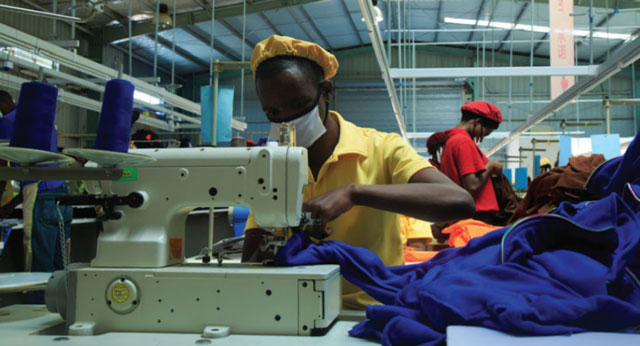
Rwanda Budget scraps tax on imported textile machinery, tannery equipment
Kigali, Rwanda | IVAN NGOBOKA| In a bid to boost domestic manufacturing, the government of Rwanda has scrapped tax on imported textile machinery and tannery equipment.
The announcement was made during the presentation of the 2017/18 Budget before Parliament on June 08.
According to the Minister for Finance and Economic Planning, Amb. Claver Gatete, the 25% tax on textile machinery and tannery equipment will be scrapped.
This comes a year after government hiked import duties by 12 percent for used clothes and 15 per cent for the shoes.
The development is further motivated by agreement of East African countries to impose a total ban on used textile by 2019.
According to Saidi Hitimana, the General Manager of C&H Garments Ltd, a Chinese textile firm located at the Kigali Special Economic Zone, the move is a welcome one.
“Government has been supportive in many ways, first they allowed us to import fabric duty free, and now that they are doing the same for machinery is more good news,” he said.
The move also comes at a time when government is planning to ban the export of raw hides and skins as a way of encouraging investment in tanneries.
Phillipe Mugabo, the general manager of Dala SlaughterHhouse in Kicukiro suburb, Kigali said given the recent development, their company is considering investing in a tannery which previously cost US$2million with taxes.
According to the Export Commodities Highlights published by the National Agricultural Export Development Board (NAEB), an average of $ 7 million is generated from the export of raw hides and skins annually, this value is expected to go up when more tanneries are rolled out, since there will be value addition.
Other winners in the budget
Consumers of wheat products are also set to start enjoying subsidised products since taxes were slashed from 35% to 0%. Taxes on sugar and rice imported out of the East African region were reduced by 75% and 30% respectively.
In a bid to boost the move to a cashless economy, the government has also removed the 25% tax on accessories like Automated Teller Machines (ATM) and Point Of Sale Systems (POS).
Meanwhile, public transport operators also have reason to praise the new Budget following the lowering of the import duty from 25% to 10 per cent for buses licensed to carry between 25 and 50 passengers, while those with capacity to transport over 50 passengers from 25% to 0%.
This move is expected to improve the country’s public transport sector, which is still faced by a shortage of public transport service vehicles.
Motor vehicles with capacity between five and 20 tonnes will be taxed at 10 per cent from 25%, and those with capacity beyond 20 tonnes will be tax exempt.
Gatete said the government will focus on construction of the Bugesera International Airport, upgrading Kamembe Airport, improving and sustaining quality of road network through construction, rehabilitation and maintenance of road networks across the country.
General Stance
Meanwhile, the government plans to raise spending by 7 per cent in the 2017/18 fiscal year to Rwf2.09 trillion ($2.58 billion), Finance minister, Claver Gatete said
“17 per cent of the budget will be funded by grants and the rest by domestic revenue and loans,” he said.
The minister said that 54 per cent of the budget would be used on recurrent expenditure with an increment of Rwf131 billion ($155 million), part of which will be used to finance the August presidential elections and salaries in new government institutions.
The government plans to use Rwf937 billion ($1.1 billion) on development projects, an increase of 44.4 per cent from the fiscal year ending June, Gatete added.
The cash will be used for promoting export products, agriculture and expansion of state-run airline RwandAir, completing the construction of a new airport and renovation existing airports. The money will also go to towards roads, power transmission lines, and water supply.
Rwanda’s economy is projected to grow by 6.2 percent in 2017 and 6.8 percent in 2018, from 5.9 percent in 2016. And the Ministry of Finance and Economic Planning says that inflation would edge down to 6 per cent in 2018.
Regional Scope
East African Community (EAC) member states have prioritised development expenditure as countries look to further strengthen the growth agenda of the regional economies.
In the national budget estimates presented, Tanzania will be spending $14.21 billion and Uganda $8.09 billion in the fiscal year 2016/17. Rwanda plans to spend some Rwf2.09 trillion compared to the Rwf1.95 trillion spent this fiscal year.
Kenya’s budget for the 2017/2018 fiscal year was presented in March to give room for the forthcoming general elections in August. Burundi budget reading is not aligned with that of the other EAC member states.
The EAC states presented their 2017/18 budgets under the theme, ‘Industrialisation for job-creation and shared prosperity’.
 The Independent Uganda: You get the Truth we Pay the Price
The Independent Uganda: You get the Truth we Pay the Price




Excellent defeat! I will trainee although you amend your website, how could i subscribe for your web site site? A account made it easier for me a pertinent offer. I actually were a little bit comfortable with this your own broadcast presented vibrant see-thorugh notion